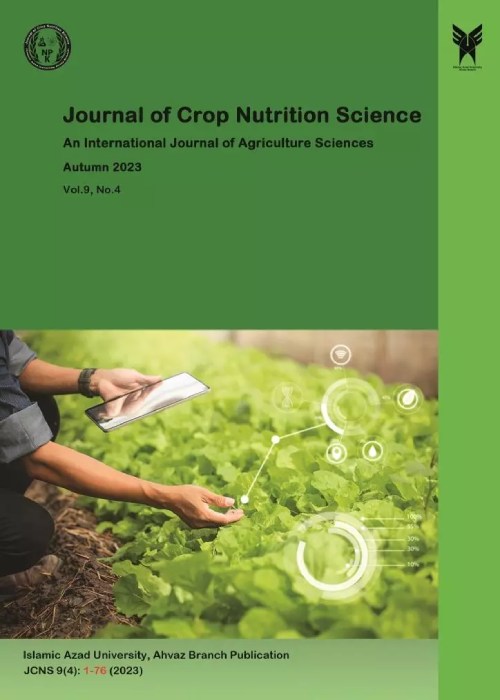Assess Effect of Rhizobium Bacteria (Rhizobium leguminosarum L.) and Iron Nano-chelate on Seed yield and its Components of Pinto Bean (Phaseolus vulgaris L.) Cultivars
Author(s):
Article Type:
Research/Original Article (بدون رتبه معتبر)
Abstract:
BACKGROUND
One of the best management methods to preserve soil quality is the use of biofertilizers and the use of Nano-fertilizers. Nano-fertilizers are the most effective and at the same time the most independent method of fertilizers, which are aimed at reducing the loss of nutrients and increasing the efficiency of fertilizer consumption.OBJECTIVES
This study was aimed to investigate the effect of foliar application of iron Nano chelate and rhizobium bacteria on crop production of pinto bean genotypes.METHODS
Current research was done according factorial experiment based on randomized completely block design (RCBD) with three replications in Ilam city in 2014. The investigated treatments include rhizobium bacteria at two levels (inoculated and non-inoculated), the foliar application agent of iron Nano-chelate at two levels (no foliar application and foliar application with iron Nano-chelate with a concentration of two per thousand) and pinto bean cultivars (including three cultivars Talash, Khomein and local).RESULT
The simple and reciprocal effects of treatments on seed yield were statistically significant. The average comparison results showed that Khomein had the highest number of pods per plant in the inoculation treatment with Rhizobium bacteria. Also, in the foliar treatment with iron Nano-chelate, Khomein cultivar had the highest number of pods per plant. Using iron Nano-chelate increased the number of pods per plant by increasing the durability of flowers and turning them into pods. Khomein cultivar had the highest seed yield (with an average of 4759 kg.ha-1) in the treatment of inoculation with rhizobium bacteria and foliar application with iron Nano-chelate.CONCLUSION
Based on the results, the use of Khomein cultivar with foliar application, in all cases replace of iron Nano-chelate and inoculation with Rhizobial bacteria can be effective in increasing the yield of pinto beans in the region.Keywords:
Language:
English
Published:
Journal of Crop Nutrition Science, Volume:9 Issue: 1, Winter 2023
Pages:
71 to 80
https://magiran.com/p2629548
دانلود و مطالعه متن این مقاله با یکی از روشهای زیر امکان پذیر است:
اشتراک شخصی
با عضویت و پرداخت آنلاین حق اشتراک یکساله به مبلغ 1,390,000ريال میتوانید 70 عنوان مطلب دانلود کنید!
اشتراک سازمانی
به کتابخانه دانشگاه یا محل کار خود پیشنهاد کنید تا اشتراک سازمانی این پایگاه را برای دسترسی نامحدود همه کاربران به متن مطالب تهیه نمایند!
توجه!
- حق عضویت دریافتی صرف حمایت از نشریات عضو و نگهداری، تکمیل و توسعه مگیران میشود.
- پرداخت حق اشتراک و دانلود مقالات اجازه بازنشر آن در سایر رسانههای چاپی و دیجیتال را به کاربر نمیدهد.
In order to view content subscription is required
Personal subscription
Subscribe magiran.com for 70 € euros via PayPal and download 70 articles during a year.
Organization subscription
Please contact us to subscribe your university or library for unlimited access!



